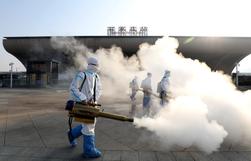 Workers disinfect the western square of Shijiazhuang Railway Station in Hebei province, on Sunday. (LIANG ZIDONG / XINHUA)
Workers disinfect the western square of Shijiazhuang Railway Station in Hebei province, on Sunday. (LIANG ZIDONG / XINHUA)
This year's Spring Festival travel rush poses a new test for China's COVID-19 control efforts, especially in northeastern regions, which continue to see new locally transmitted cases.
The Chinese mainland recorded 33 new locally transmitted COVID-19 cases on Sunday, including 22 in Heilongjiang province and 10 in Jilin province, the National Health Commission said on Monday.
The city government in Jixi, Heilongjiang, criticized one community for overreacting and misinterpreting COVID-19 prevention and control principles, Xinhua News Agency reported on Monday
"The upcoming Spring Festival is a rush time for migrant workers to return to their homes in Northeast China," leading respiratory disease expert Zhong Nanshan said on Monday during a video call with Yang Baofeng, a professor at Harbin Medical University.
"Those returnees may attend weddings and visit relatives and friends after returning, creating more opportunities for the virus to spread."
Monitoring of misconduct is also being stepped up to prevent overreactions to the virus threat.
READ MORE: China sees less Spring Festival travel amid pandemic control
The city government in Jixi, Heilongjiang, criticized one community for overreacting and misinterpreting COVID-19 prevention and control principles, Xinhua News Agency reported on Monday.
Staff members of the Xingfuli community in Jixi's Jiguan district stuck a paper seal on the door of a returnee from a low-risk region for COVID-19 to prevent them from going outside. Information on the door showed that the returnee had come from Wenzhou, Zhejiang province, and was required to stay at home for seven days.
An investigation was launched by the district government and local authorities urged community officials to apologize for imposing improper measures on the returnee and remove the seal immediately.
According to a notice released recently by the National Health Commission, people traveling from other provincial-level regions to rural areas for family reunions must be able to show a negative nucleic acid test result obtained in the previous seven days.
Such travelers are also required to monitor their health conditions, such as body temperature and any respiratory disease symptoms, in their first 14 days at home. During this period, they must also have a nucleic acid test every seven days.
ALSO READ: Stricter measures introduced for Spring Festival travel rush
During a conference on epidemic prevention and control held on Sunday afternoon, Jiguan district officials urged related departments to eliminate misinterpreted prevention measures across the district.
They said people who only need to monitor their health condition cannot be forced into home quarantine or locked up at home.
Heilongjiang also detected nine asymptomatic carriers of COVID-19 on Sunday, the provincial health commission said on Monday.
All the confirmed and asymptomatic cases were found in Suihua's Wangkui county and the provincial capital, Harbin, the two areas most affected by a recent outbreak.
The provincial civil affairs department is promoting policies in rural areas to care for left-behind children whose parents will stay where they work during the Spring Festival holiday.
"Rural communities are asked to acquire accurate information of the left-behind children and ensure an eligible guardian for each child," department official Yang Xiaoguang told a news conference on Monday. "We will recruit more volunteers and community workers to provide psychological counseling, study tutorials and some other services for rural left-behind children, helping them enjoy the Spring Festival and winter vacation."
Neighboring Jilin province recorded 10 new local confirmed cases on Sunday, the provincial health commission said on Monday. No asymptomatic or suspected cases were detected.
There was also one confirmed case and one asymptomatic carrier recorded in Hebei province on Sunday.
Over 60 percent of confirmed COVID-19 patients in Shijiazhuang, Hebei's provincial capital and the place on the mainland hit hardest by the disease this year, had recovered and been discharged from hospital by Monday afternoon, a news conference was told.


